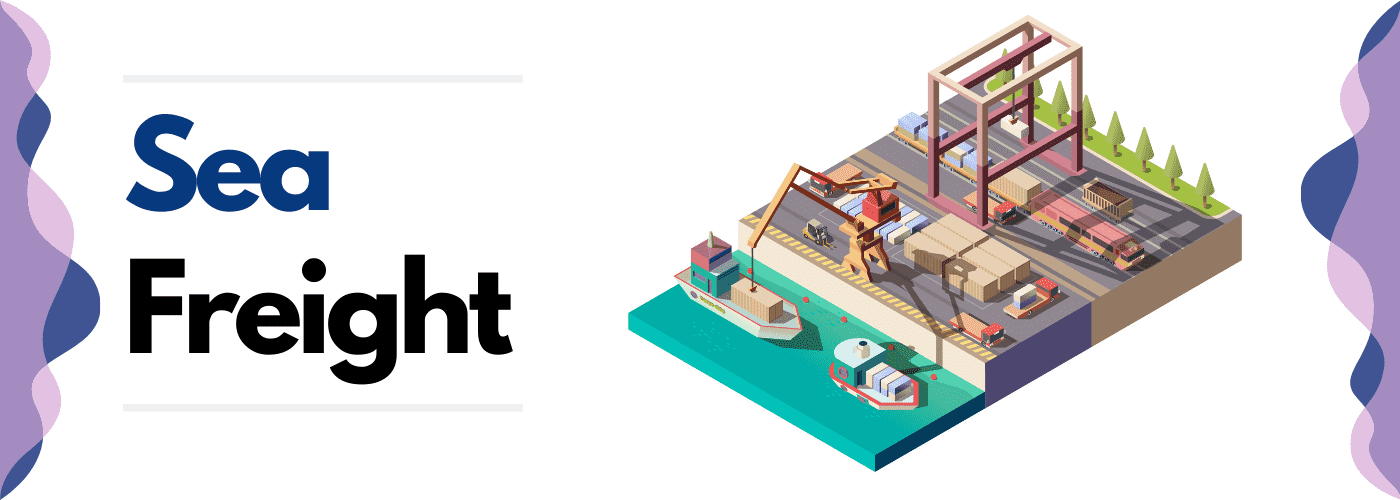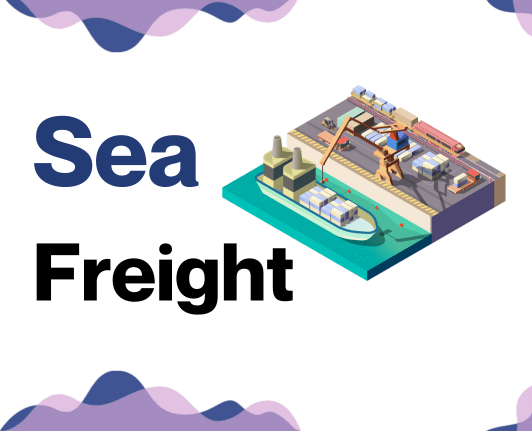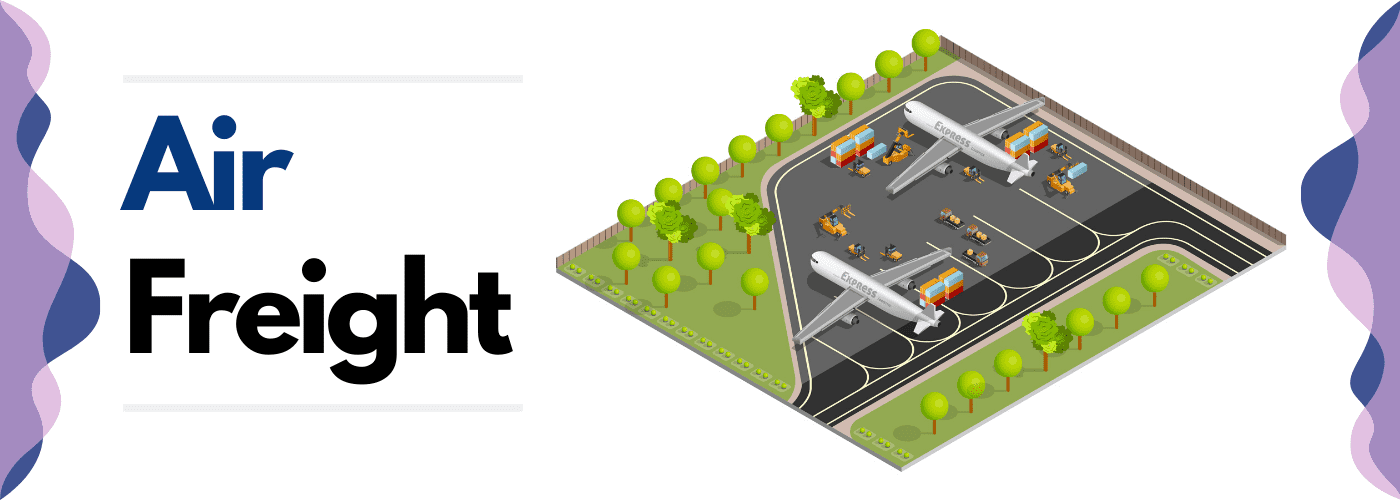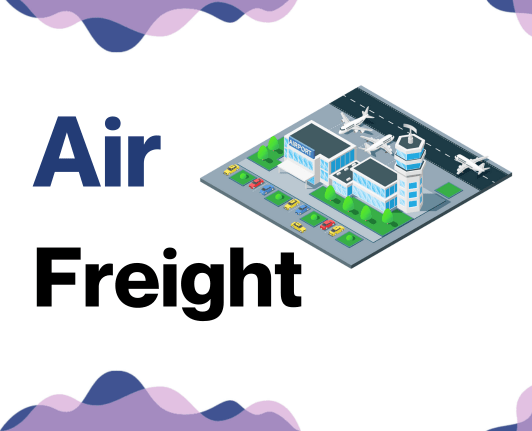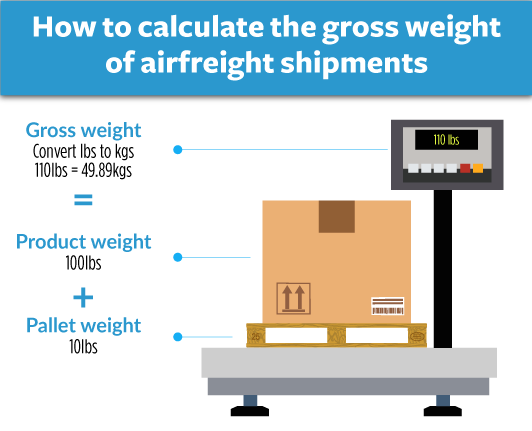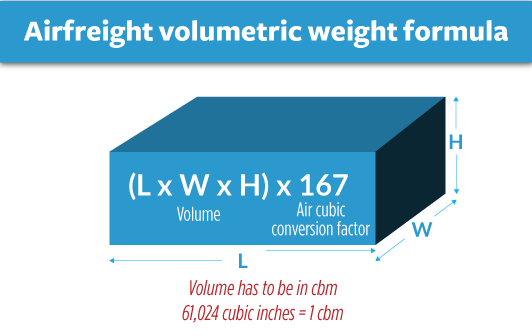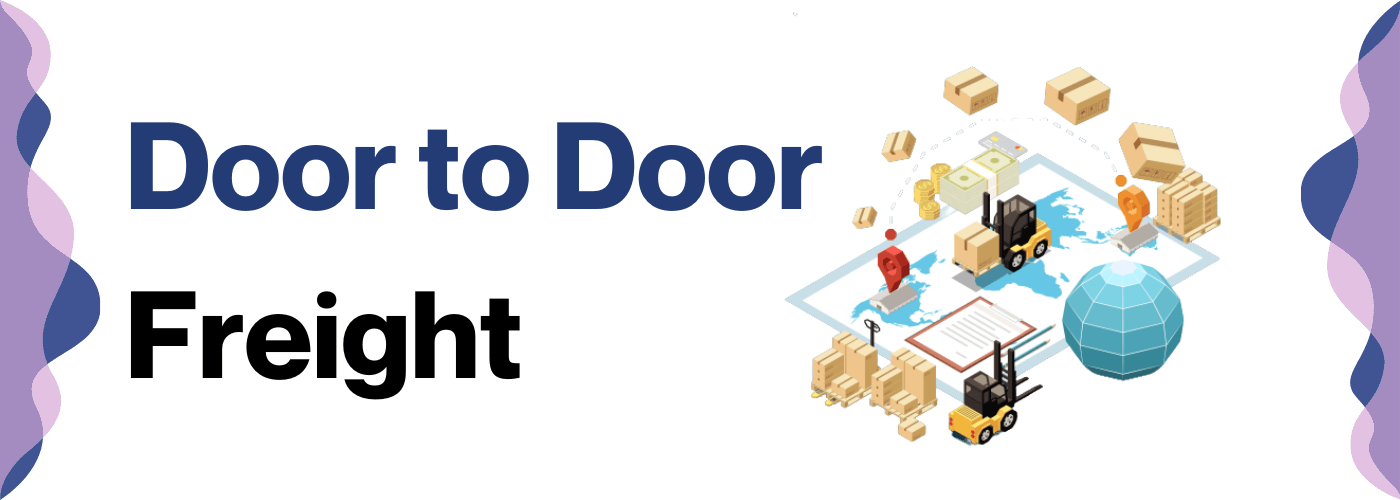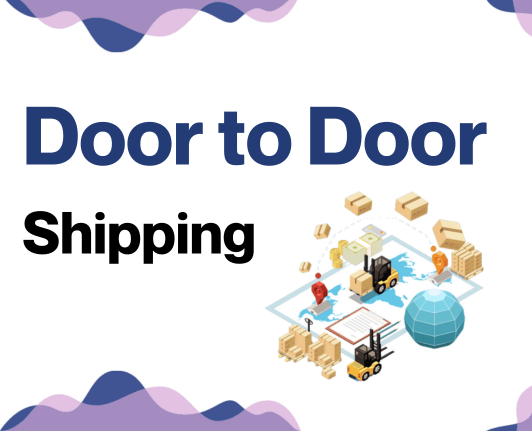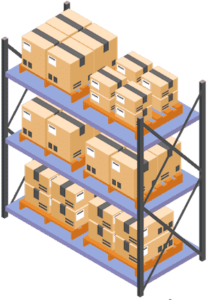If transporting freight between the UK and Lebanon feels like trying to teach your grandma how to use a smartphone, you're not alone. Many businesses grapple with understanding freight rates, transit times, and complicated customs regulations.
This comprehensive guide aims to demystify these aspects, providing insights into different freight options – be it air or sea. We delve into the customs clearance process, offer advice on duties and taxes, and provide professional guidance tailored specifically for businesses operating between these two distinct regions.
If the process still feels overwhelming, let DocShipper handle it for you! As an international freight forwarder, we manage every step of the shipping process, converting potential hurdles into success stories for your business.
Table of Contents
Which are the different modes of transportation between UK and Lebanon?
Shipping from the UK to Lebanon: a geographical puzzle! The distance and international borders rule out road or rail transport. The seas, however, are open. As if getting ready for a game of chess, you'd place your king - your goods - on the board, pondering your next move. You're left with two prime pieces; air or ocean freight. You need to strategize.
Will it be the swift falcon of the skies (air freight), or the steady tortoise traversing the sea (ocean freight)? Picking the right one depends on your shipment's unique needs and characteristics. And this guide is your rulebook!
How can DocShipper help?
Looking to ship goods between the UK and Lebanon? Let DocShipper be your guide. From customs clearance to transportation, our expert team handles it all, simplifying your shipping process. Need advice? Get in touch with our consultants for free. Plus, want a cost estimate? Contact us and get a free quote within 24 hours.
DocShipper Tip: Ocean freight might be the best solution for you if:
- You're dealing with large quantities or oversized items. Sea freight offers a budget-friendly way to maximize space, a particularly useful option given the UK's extensive port network.
- Your shipment isn't on a tight schedule. Ocean transport typically takes longer than air or rail, but it offers reliability.
- Your supply chain involves key ports, allowing you to take advantage of a wide-reaching network of sea lanes.
Sea freight between UK and Lebanon
Welcome to the bustling world of ocean shipping between the UK and Lebanon, where tons of goods play tag across the azure seas connecting key industrial centres. Sea freight stands as a cost-effective solution for shipping high-volume goods, despite being a bit of a tortoise in the speed department. Imagine a heavyweight champion in a marathon: slower but powerful and economical.
But brace yourself: the shipping process isn't for the fainthearted. Like navigating a maze in the dark, many businesses stumble on unexpected obstacles and commit avoidable errors. Learning the secrets of the trade can feel like trying to solve a Rubik's cube.
This section ticks all the boxes to help you conquer the hurdles, revealing best practices and specifications to change your shipping journey from a storm-ridden sea to a smooth sail. Consider it your trusty compass, guiding you past the whirlpools to perfect your shipping game. Buckle up, because a breezy shipping experience is on the horizon.
Main shipping ports in UK
Felixstowe Port
Location and Volume: Located in Suffolk, England, Felixstowe Port is the UK's largest and busiest container port. Handling over 4 million TEUs (Twenty-Foot Equivalent Units) annually, it's a vital hub for UK-Europe trade.
Key Trading Partners and Strategic Importance: European countries, the Asian market, and North America form the top trading partners. The port’s strategic location makes it a point of connectivity to major European ports, generating economic influence.
Context for Businesses: Through the Felixstowe Port, businesses with significant trade within Europe and Asia can drastically reduce their logistics time and cost, especially beneficial for time-sensitive goods.
Southampton Port
Location and Volume: Situated on the south coast of England, Southampton Port handles around 2 million TEUs yearly, ideal for transatlantic and European trade.
Key Trading Partners and Strategic Importance: The port’s primary trading partners include North America, the Far East, and Europe. It houses the UK's second-largest deep-sea container terminal, boosting its importance.
Context for Businesses: If expanding to the United States or Asia is on your agenda, the Southampton Port's direct links provide robust connectivity, reducing shipping times and potentially improving supply chain reliability.
London Gateway
Location and Volume: Located on the River Thames's north bank, London Gateway, with an annual capacity for 3.5 million TEUs, facilitates trade in the highly populated South East.
Key Trading Partners and Strategic Importance: Predominantly trading with Asia and Europe, it's the newest deep-sea container port and largest logistics park, driving the UK's economic growth.
Context for Businesses: For companies eyeing the UK's lucrative South East market, London Gateway provides a quick inroad given its efficient logistics park meant for storage and distribution.
Immingham Port
Location and Volume: Based on the Humber's south bank, Immingham Port is the UK's busiest port by tonnage, with the capacity to handle millions of tons of cargo.
Key Trading Partners and Strategic Importance: Key trading partners include Scandinavia, Northern Europe, and North America. It's crucial for energy, handling a large proportion of the UK's fuel imports.
Context for Businesses: If your enterprise relies heavily on energy-related imports like coal or oil, Immingham Port becomes a logistics key due to its vast fuel handling capabilities.
Liverpool Port
Location and Volume: Located on the eastern side of the River Mersey Estuary, Liverpool Port handles several types of cargo annually.
Key Trading Partners and Strategic Importance: Key partners include North America, Asia, and the Middle East. The port’s well-suited for multi-modal transportation due to its links to the railway network.
Context for Businesses: Liverpool Port provides a versatile shipping solution for businesses with the varied goods transport requirement, backed by excellent railway connectivity for a streamlined supply chain.
Grimsby Port
Location and Volume: Found on the Humber estuary, Grimsby Port handles a variety of cargo, including cars and perishables with specialized facilities.
Key Trading Partners and Strategic Importance: Prominent partners are Northern Europe and Asia. Known as the 'Food Town', Grimsby is crucial for the food industry, particularly seafood.
Context for Businesses: For businesses trading perishable goods such as seafood or fruits, Grimsby Port offers specifically equipped facilities that ensure quality-consistent delivery.
Main shipping ports in Lebanon
Port of Beirut
Location and Volume: Located in the heart of the Mediterranean Sea, the Port of Beirut is indispensable for Lebanon's import and export activities, with a shipping volume of approximately 1.1 million TEUs per year.
Key Trading Partners and Strategic Importance: The port has diverse trading partners, including countries in the Middle East, Europe, Africa, Asia, and North and South America. The Port of Beirut plays a crucial role in Lebanon's economy, contributing around 20% of total national income.
Context for Businesses: If you are contemplating extending your services into the Middle Eastern markets or want to capitalize on Lebanon's strategic location, the Port of Beirut could be integral to your shipping strategy. It offers comprehensive cargo services, modern infrastructure, and has numerous storage and freight stations, providing versatility for various business needs.
Note that this description pertained to the situation before the August 2020 explosion at the Port of Beirut, which devastated large parts of the port. Today, capacity and infrastructure have been significantly reduced. Reconstruction and rehabilitation efforts are in progress, but make sure to follow the latest updates and consult with logistics experts before making any shipping considerations involving this port.
Port of Tripoli
Location and Volume: The second primary port in Lebanon, the Port of Tripoli, is situated in the country's north and serves as a gateway to numerous Mediterranean and European countries, handling around 600,000 TEUs annually.
Key Trading Partners and Strategic Importance: The Port of Tripoli maintains strong trade relationships with European, African, and Asian countries. It is known for its modern infrastructure and state-of-art expansion plans, making it one of the key economic hubs in Lebanon.
Context for Businesses: If you are planning on reaching out to the northern and eastern Lebanese market or neighboring Syrian and Jordanian markets, the Port of Tripoli offers strategic advantages. Its expanding infrastructure, coupled with a range of facilities that cater to different types of goods, makes it an attractive proposition for a wide range of businesses.
Note: Lebanon primarily has these two ports - Port of Beirut and Port of Tripoli, but as of current events after the explosion in 2020, the Port of Beirut operates at a reduced capacity, and a major chunk of its operations were rerouted to the Port of Tripoli. Therefore, it's important to stay updated with the latest information regarding shipping and operational capacity changes.
Should I choose FCL or LCL when shipping between UK and Lebanon?
Shipping your goods between the UK and Lebanon necessitates a critical choice: Full Container Load (FCL) or Less Container Load (LCL), otherwise known as consolidation. This vital decision will impact your shipping costs, delivery times, and, ultimately, your business's success. Choose wisely.
The following section will guide you through the specifics of FCL and LCL, depicting clearly how they affect your bottom line and lead times. By the end, you'll be better equipped to select the shipping solution that aligns perfectly with your unique business needs. Let's set sail through the sea of freight options.
LCL: Less than Container Load
Definition: Less than Container Load (LCL) shipping involves consolidating smaller shipments from multiple customers into a single container for transportation. It's an ideal choice for businesses that don't have enough goods to fill an entire container.
When to Use: Opt for LCL shipping when your cargo is between 13 to 15 cubic meters. It offers flexibility which is beneficial for smaller businesses as it allows them to ship goods in low volumes while distributing the cost of freight among multiple shippers.
Example: Let's imagine an artisan chocolate maker in the UK, looking to sell their products in Lebanon. Their monthly shipments only fill about half of a standard 20ft container, so they choose LCL. The chocolates can be shipped alongside other goods in one container, making it both cost-effective and efficient.
Cost Implications: While LCL offers lower shipping costs for smaller volumes, it can be more expensive per cubic meter than Full Container Load (FCL), since LCL involves more handling for freight consolidation, deconsolidation, and related administrative work. Always compare LCL freight and FCL freight to determine the best option for your cargo size.
FCL: Full Container Load
Definition: FCL (Full Container Load) represents full container shipping, wherein your goods completely occupy a 20'ft or 40'ft FCL container meant for single shipment use.
When to Use:
FCL shipment is a wise choice when the cargo volume exceeds 13/14/15 CBM. This strategy can be cheaper for considerable volumes and offers better safety as the container is sealed from origin to destination.
Example:
Let's say you're a UK based furniture company, exporting large sets to Beirut. Because these items are bulky and add up above 15 CBM, using FCL shipping would be efficient and may limit potential damage during transfers, as your goods remain in the sealed container.
Cost Implications:
However, it's essential to consider that FCL shipping costs depend on a variety of factors. FCL shipping quotes take into account the container size, distance, seasonality, and commodity type. While FCL can be a cost-effective option for large volumes, remember that you'll be paying for the full container, irrespective of whether you fill it completely or not. Therefore, it's imperative to assess your shipment volume accurately before choosing FCL.
Unlock hassle-free shipping
Choosing between consolidation and a full container for shipping between the UK and Lebanon? Let DocShipper's ocean freight experts guide you. We consider factors like the size of your shipment, the nature of the goods, and your budget. With our commitment to simplifying international shipping, you can focus on your business while we ensure your goods arrive safely. Ready for a freight service that fits your needs like a glove? Contact us now for a no-obligation, free cost estimation.
How long does sea freight take between UK and Lebanon?
On average, sea transport from the United Kingdom to Lebanon typically takes around 20 to 30 days. It's important to note that these transit times hinge on factors comprising the specific ports utilised in both countries, the weight and nature of the goods being shipped.
To get an accurate, bespoke quote for your shipment need, we recommend you contact an experienced freight forwarding service like DocShipper.
| UK Port | Lebanese Port | Average Transit Time (in days) |
| Port of Southampton | Port of Beirut | 32 |
| Port of Felixstowe | Port of Tripoli | 18 |
| Port of Liverpool | Port of Beirut | 20 |
| Port of London | Port of Tripoli | 25 |
*These are average estimates, the exact transit period might vary depending upon certain unpredictable factors or specific shipping details.
How much does it cost to ship a container between UK and Lebanon?
Calculating the exact shipping cost between the UK and Lebanon can feel like solving a complex puzzle. With ocean freight rates swinging between a broad range, it's not easy to pinpoint. Variables such as Point of Loading and Destination, carrier selection, nature of goods, and ever-changing marketplace conditions all cast a shadow on precise figures.
But don't fret! While we don't offer a one-price-fits-all, our dedicated shipping specialists are committed to unraveling this puzzle for you. Drawing on our nuanced understanding of these elements, we deliver personalized quotes for each case, ensuring the best rates for your specific shipping needs. Because when it comes to freight forwarding, it's all in the details.
Special transportation services
Out of Gauge (OOG) Container
Definition: An OOG container is designed for cargo that doesn't fit standard containers due to its size or shape. In short, Out of gauge cargo signifies goods exceeding the dimensions of a regular 20 or 40-foot container.
Suitable for: Large machinery, oversized equipment, or substantial assembled parts.
Examples: Industrial equipment like turbines, large components of aircraft, construction machinery like excavators or bulldozers.
Why it might be the best choice for you: If your cargo exceeds the standard container dimensions, an OOG container is usually the way to go. This would ensure secure transportation of your large-size or irregularly-shaped goods from the UK to Lebanon.
Break Bulk
Definition: Break bulk refers to the handling of cargo as separate pieces rather than unitized in a container. These loose cargo loads are often palletized, crated, or secured on skids.
Suitable for: Cargo that is not containerized and can be handled individually.
Examples: Bags of grain, boxes of machinery parts, barrels of liquor, or bundles of steel.
Why it might be the best choice for you: If your goods are not suited for container shipping and can withstand exposure to elemental factors, break bulk can prove efficient and cost-effective.
Dry Bulk
Definition: Dry bulk refers to granular products transported unpackaged in large quantities like commodities, including coal, grain, or gravel.
Suitable for: Commodities and raw materials that flow readily.
Examples: Minerals, metal ores, coal, sand, cement, grains, or sugar.
Why it might be the best choice for you: If you're transporting large quantities of free-flowing solids, dry bulk is typically the most efficient method, offering economical bulk purchase and shipment.
Roll-on/Roll-off (Ro-Ro)
Definition: Ro-Ro, or Roll-on/Roll-off, describes vessels designed to carry wheeled cargo. These ro-ro vessels allow vehicles to be driven directly on and off the ship.
Suitable for: Vehicles or heavy machinery on wheels like cars, buses, trucks, tractors, trailers, railroad cars.
Examples: Exporting cars or large tractors, shipping large plant equipment.
Why it might be the best choice for you: Ro-Ro is optimal if your cargo involves wheeled vehicles or machinery. This method saves time by eliminating cranes and forklifts from the offloading process.
Reefer Containers
Definition: Reefer containers, or refrigerated containers, are temperature-controlled units used for the transportation of perishable goods.
Suitable for: Perishable products, temperature-sensitive chemicals, pharmaceutical goods.
Examples: Seafood, fruits, vegetables, meats, dairy products, or medicines.
Why it might be the best choice for you: Reefer containers are ideal if your goods need to maintain certain temperature conditions while traveling from the UK to Lebanon to ensure their freshness and quality.
No matter your shipping needs, our expert team at DocShipper is ready to assist. Navigating international freight can be complex, but we'll advise on the most suitable shipping method for your business. For a free shipping quote in less than 24 hours, contact us today.
DocShipper Tip: Air freight might be the best solution for you if:
- You're facing tight deadlines or need rapid delivery. Air freight is your quickest option, which aligns well with the fast-paced business environment.
- Your shipment is relatively small, under 2 CBM. Air freight is ideal for these more compact loads.
- Your cargo's destination isn't easily reached via sea or rail. This makes air freight a viable option, especially given the extensive network of airports available.
Air freight between UK and Lebanon
Air freight from the UK to Lebanon is like a premium express service for your goods. It's perfect for items crunched for time, high in value, or petite in size, for example, electronics or important documents. This speedster of international trade offers rapid delivery and solid dependability by skipping most of the traffic on the maritime and highway routes.
However, just as one needs to be canny while choosing the swiftest horse in a derby, shippers must strategize with air freight. They often bungle calculating the cost, by misjudging weights. The impact? Needlessly inflated expenses - Imagine paying for an elephant when only a monkey is your traveller! Plus, ignoring smart practices can burn a hole bigger than the Great Blue Hole in their pockets! Let's explore these further.
Air Cargo vs Express Air Freight: How should I ship?
Choosing between air cargo and express air freight can be a dilemma, especially when freighting between the UK and Lebanon. Imagine air cargo as booking a seat on a commercial airline, where you and other businesses share the flight.
On the other hand, express air freight is like having your private jet, where your goods get the entire plane to themselves for speedy delivery. Read on and we'll break down the perfect choice for your business based on factors like cost, speed, and handling.
Should I choose Air Cargo between UK and Lebanon?
If you're shipping between the UK and Lebanon, air cargo offers a reliable and budget-friendly option, especially for shipments over 100kg/220lbs.
Major airlines like British Airways, and Middle East Airlines, offer cargo services delivering goods swiftly and efficiently. Although airfreight typically has longer transit times due to fixed schedules, its cost-effectiveness for heavier loads, combined with the security and reliability of using established international airlines, adds to its appeal. Your budget and shipping needs could find the perfect match with air cargo.
Should I choose Express Air Freight between UK and Lebanon?
Unsure whether to opt for Express Air Freight for your UK-Lebanon shipments? Best for cargo under 1 CBM or 100/150kg (220/330 lbs), this specialized service utilizes dedicated cargo planes and guarantees speed.
Global players like FedEx, UPS, and DHL ensure timely and reliable delivery. If your business needs quick turnaround times or deals with high-value, time-sensitive goods, Express Air Freight might be the perfect solution. It's efficient and designed for your convenience.
Main international airports in UK
Heathrow Airport
Cargo Volume: Approximately 1.39 million metric tons in 2023.
Key Trading Partners: USA, China, Australia, India, and Germany.
Strategic Importance: As Europe's busiest airport, Heathrow plays a crucial role in the trading and transportation of international goods. It is centrally positioned in the UK, allowing for easy distribution to northern and southern regions.
Notable Features: Operates two runways and five terminals, with a robust roster of air freight forwarders.
For Your Business: With a significant global trading network and substantial handling capacity, Heathrow can seamlessly handle your cargo requirements, offering optimal flexibility and reliable transit schedules.
Manchester Airport
Cargo Volume: Around 100,000 metric tons annually.
Key Trading Partners: USA, Middle East, and Europe.
Strategic Importance: Manchester Airport is the busiest airport for freight and cargo outside the London region.
Notable Features: It has excellent road and rail connections, allowing for quick and efficient distribution of goods.
For Your Business: If you're aiming to expand your trade to Northern England, Manchester Airport facilitates efficient movement of your cargo. Plus, its direct access to local highways reduces transportation time post-arrival.
East Midlands Airport
Cargo Volume: Nearly 390,000 metric tons per year.
Key Trading Partners: USA, Spain, UAE, Belgium, and Germany.
Strategic Importance: EMA is the UK's busiest pure cargo airport and represents a key hub for mail and express freight operators.
Notable Features: Offers 24/7 cargo operations with no noise abatements, a clear advantage for time-sensitive cargo.
For Your Business: East Midlands Airport is ideal if your business revolves around time-critical shipping. Their 24/7 operations cater to all your shipping needs, irrespective of the hour.
Stansted Airport
Cargo Volume: Approximately 280,000 metric tons annually.
Key Trading Partners: Hong Kong, USA, Turkey, and UAE.
Strategic Importance: Stansted features Europe's largest airline maintenance center, making it an important transit hub for perishables, e-commerce, and other high-value goods.
Notable Features: Stansted has one of the newest cargo facilities in the UK, with 2.4 million sq ft for cargo handling.
For Your Business: Stansted's modern facilities ensure efficient processing, reducing your cargo's transit time. If your business operates with temperature-sensitive or high-value goods, Stansted’s advanced handling facilities are an asset.
Gatwick Airport
Cargo Volume: Over 96,000 metric tons per year.
Key Trading Partners: USA, EU, UAE, and Hong Kong.
Strategic Importance: Gatwick is an important airport for transporting perishables and pharmaceuticals due to its impressive handling facilities.
Notable Features: Includes a major perishables handling centre for time- and condition-sensitive commodities.
For Your Business: If your business regularly ships perishables or pharmaceuticals, Gatwick's specialized handling facilities will ensure your cargo arrives in optimal condition, effectively reducing spoilage risk and maximizing your profit margin.
Main international airports in Lebanon
Rafic Hariri International Airport
Cargo Volume: Rafic Hariri International is the busiest airport in Lebanon, handling over 8,000 tonnes of cargo each month.
Key Trading Partners: Key trading partners include Dubai, Istanbul, and Europe, particularly Germany and Italy.
Strategic Importance: It's the main hub for air cargo in Lebanon with its advanced logistics facilities and it’s located around 9 km from Central Beirut, making it conveniently situated.
Notable Features: The airport has well-equipped cargo facilities with the capability to handle various types of cargo such as fresh goods, pharmaceutical products, livestock, and dangerous goods.
For Your Business: If your business ships perishable items or needs to get products to markets quickly, Rafic Hariri International is an excellent option. It’s proximity to major markets in Europe, Asia, and the Middle East can help to minimize transit times and keep shipping processes efficient.
How long does air freight take between UK and Lebanon?
The average duration to ship between the UK and Lebanon by air freight is typically 1 to 3 days. However, the exact transit time hinges on various factors such as the specified airports of departure and arrival, the weight of your shipment, and the type of goods you're sending.
To get precise times tailored to your specific cargo, it's best to consult with a professional freight forwarder such as DocShipper.
How much does it cost to ship a parcel between UK and Lebanon with air freight?
Shipping air freight parcels from the UK to Lebanon roughly averages between £2-£4 per kg. However, providing an exact rate isn't straightforward due to several variables such as distance from airport departure and arrival, parcel dimensions, weight, and nature of goods.
Rest assured, our dedicated team will work with you intimately to offer the best rates, providing bespoke quotes on a case-by-case basis. Don't hesitate – reach out and receive a free quote in less than 24h. Your business, your shipping needs, our expert solutions.
What is the difference between volumetric and gross weight?
Gross weight refers to the actual physical weight of the shipment, measured in kilograms. Volumetric weight, on the other hand, accounts for the space that the goods occupy, irrespective of their actual weight.
To calculate the gross weight in air cargo, you simply weigh the goods along with any packaging or pallets. For instance, if your shipment, including its packaging, weighs 30 kg, the gross weight is 30 kg, which equals roughly 66 lbs.
Calculating the volumetric weight is a bit more complex. In air cargo, you first record the dimensions of the parcel, measuring length, width, and height in centimeters. Then, multiply these dimensions together and divide the result by 6000, conforming to IATA regulations.
So, if your parcel dimensions are 50 cm (length) x 40 cm (width) x 30 cm (height), the volumetric weight will be 10 kg, or approximately 22 lbs.
Express Air Freight, however, uses a different divisor - 5000. Using the same package dimensions as before, the volumetric weight for Express Air would be 12 kg, or roughly 26.5 lbs.
Why do these calculations matter? It's because freight charges are often determined by the greater of the two weights - either the gross weight or the volumetric weight. So, understanding these measurements allows you to predict your shipping costs more accurately.
DocShipper tip: Door to Door might be the best solution for you if:
- You prioritize ease and a hassle-free shipping experience. Door-to-door services manage the entire process, from collection to final delivery.
- You appreciate the efficiency of having one dedicated contact. With door-to-door, a single agent is responsible for overseeing all elements of your shipment.
- You want to limit the number of times your cargo is transferred. Door-to-door services minimize the switches between various transport methods, lowering the chances of damage or loss.
Door to door between UK and Lebanon
International door-to-door shipping is a comprehensive solution that covers the entire process of transferring goods from the UK to Lebanon. With door-to-door, forget about the hassle and enjoy the benefits including convenience, time-saving, and cost efficiency. So, if you're eyeing seamless, worry-free transport with high transparency, you're in the right place. Let's dive in!
Overview – Door to Door
Imagine shipping goods from the UK to Lebanon without worrying about the logistics. That's door-to-door shipping for you! As the most popular choice among DocShipper's clients, this service cuts through the complexities of the shipping process.
It includes everything - from picking up your goods in the UK, to handling customs clearance, all the way to delivery in Lebanon. Despite potentially higher costs, its convenience and ease of mind make it a stress-free solution. However, adjusting your budget may become necessary. Still, who wouldn't want a seamless, breezy shipping experience? That’s door-to-door for you. It turns dread into delight!
Why should I use a Door to Door service between UK and Lebanon?
Ever wondered how to ship to Lebanon with the ease of ordering a takeout meal? Well, wonder no further! Door to Door service between the UK and Lebanon is your one-way ticket to seamless international shipping. Here's how:
1. Less Stress: With Door to Door service, you eliminate the headache of coordinating multiple transportation and handling stages. Your goods are collected right from your premises and delivered to the final destination in Lebanon, making the entire process a breeze.
2. Timely delivery: Let's be honest, time equates to profit in business. This service is a massive relief for time-sensitive shipments needing that swift, streamlined delivery. It's about getting your goods there right on time, every time.
3. Catering for complexity: Got a massive machinery part to ship or a fragile product that requires extra attention? No worries! Door to Door service applies specialized care to complex cargo, ensuring it arrives in Lebanon safely and securely, no matter the challenge.
4. Coordinated Trucking Till Final Destination: No need to play hot potato with your goods. This service includes taking care of all logistics, even the final trucking from the Lebanese port to your customer's doorstep. No more juggling between different carriers!
5. Convenience is King: Lastly, Door to Door services simply provide unbeatable ease, like the convenience of home delivery, but across countries! Your goods' journey from the UK to Lebanon becomes one less thing you need to worry about.
So why don’t you let the experts handle the tricky bits? With Door to Door service, international shipping becomes as simple as sending a postcard.
DocShipper – Door to Door specialist between UK and Lebanon
Expertly navigating the complexities of door-to-door shipping, DocShipper takes charge. From meticulous packing to organized transport and thorough customs clearance, we deliver no-stress shipping between the UK and Lebanon.
You won't lift a finger. With a team well-versed in all shipping methods and a dedicated account executive on hand, relax as we streamline your shipping endeavours.
Request a free estimate today and receive it within 24 hours, or connect with our professional consultants at no extra cost. Trust DocShipper to be your stress-free solution for effective, efficient international freight forwarding.
Customs clearance in Lebanon for goods imported from UK
Customs clearance is the critical phase where your goods pass through authorities for import into Lebanon from the UK. It's a tricky maze to navigate, with unforeseen fees and charges often catching importers off guard.
The fine print—comprising customs duties, taxes, quotas, and licenses—requires meticulous attention. Missteps can lead to your goods getting stuck in 'customs limbo.' Guiding you through this labyrinth, this guide will unravel every critical aspect. Through accurate knowledge, you can ensure smoother, cost-efficient imports.
Here at DocShipper, we offer comprehensive assistance to navigate this complex process, irrespective of the nature of your goods or their global location. To kickstart your project budgeting, share with us the origin of your goods, their value, and HS Code. These prerequisites help us provide an accurate estimate for a seamless import process.
How to calculate duties & taxes when importing from UK to Lebanon?
Determining duties and taxes when importing goods from the UK to Lebanon entails having firm knowledge of several key factors. These include the source country for the goods - where the items were made or grown - and the specific Harmonised System (HS) Code that pertains to each individual product.
Additionally, you'll need to grasp the Customs Value of your merchandise, the applicable Tariff Rate, and investigate any other potential taxes or fees that may be applicable to your goods.
Embark on this journey by figuring out the country in which your merchandise was manufactured or produced - in this instance, we're talking about the United Kingdom. Armed with this information, you're well on your way to making an accurate estimate of your import duties and taxes.
Step 1 - Identify the Country of Origin
Identifying the country of origin - sounds straightforward, right? However, it's more critical than you might think. Here's the scoop: basically, there are five good reasons why this step cannot be overlooked.
First off, it determines the customs duties to be imposed via different trade agreements. Interestingly, Lebanon has a mix of specific agreements with the UK, offering varying duty rates. Second, the products in question could face differing restrictions based on their origin. Next, the eligibility of certain concessions or rebates rests on the shoulders of the country of origin. Fourth, import licenses need this information as a prerequisite. Lastly, your product's eligibility for duty-free entry is also based on the place of origin.
Import restrictions? Yes, Lebanon does have some. For example, used cars and certain agricultural products might face limitations. So, do your research. Carefully examine each product, its origin, and the Lebanese regulations in effect.
So, brace yourself, roll up your sleeves and start with identifying your product's country of origin - it could save you a mountain of paperwork and potentially a nice chunk of change!
Step 2 - Find the HS Code of your product
Diving into the world of shipping, you're likely to encounter the term 'Harmonized System Code' or as it's more commonly known, HS Code. This is a standardized numerical method of classifying traded products. It is used by customs authorities globally to identify products and apply duties and taxes with accuracy.
Finding the HS code of your product usually involves a simple question to your supplier. They're generally well-versed with the product they're dealing with and familiar with the pertinent regulations, so they can readily provide this key piece of information.
In cases where asking your supplier isn't an option, worry not! Here is an easy, step-by-step process to help you find your HS code.
1. Head to the 'Harmonized Tariff Schedule' on the U.S. International Trade Commission’s website.
2. In the search bar available, simply type in the name of your product.
3. Check the Heading/Subheading column that appears. This is where you’ll find your HS code.
A quick note - accuracy is of prime importance when it comes to identifying your HS code. Inaccurate HS codes can lead to delays in transportation, headaches in customs clearance and even potential fines. Make sure you take the time to find the correct code.
Here's an infographic showing you how to read an HS code.
Step 3 - Calculate the Customs Value
Understanding customs value can be tricky but it's essential for your shipping journey from the UK to Lebanon. It differs from the usual product value as it includes not just the price of the goods, but also the cost of international shipping and insurance - we call that the CIF value.
For example, you've bought a machinery part worth $2000 from the UK, shipping cost you another $500 and your insurance was $50. Your customs value is the sum of these, $2550. This CIF value is what Lebanese customs will consider when calculating import duties and taxes.
So, always factor in these costs while planning your shipment budget. Being clear on these details can save you from unpleasant surprises and budget overruns. Shipping expertise comes down to mastering these little details.
Step 4 - Figure out the applicable Import Tariff
Import tariffs are taxes imposed on imported goods, calculated as a percentage of their transaction value. For the UK, the applicable type is the Most-Favored-Nation (MFN) tariff. To identify the appropriate tariff for goods imported from the UK to Lebanon, use the UK's Global Trade online tool.
1. Access the UK's Global Trade site at UK Global Tariff.
2. Enter the Harmonized System (HS) code identified from previous steps. For example, the HS code '01012100' for horses.
3. The tool provides the applicable tariff. Assume in this case, a 5% import tariff rate.
Now, let's calculate the import duties. Suppose the Cost, Insurance, and Freight (CIF) value of a horse shipment from the UK to Lebanon is $10,000.
Import duties = (Import tariff/100) CIF
= (5/100) $10,000 = $500
As such, the import duties, levies to bring the horse into Lebanon, would be $500. Always validate this with the latest trade agreements between UK and Lebanon.
Step 5 - Consider other Import Duties and Taxes
When importing goods from the UK to Lebanon, it's crucial to recognize that in addition to standard tariffs, other duties may apply. Consider, for example:
1. Excise Duty: A tax applied to certain products, like alcohol and tobacco. If your consignment comprises these items, ensure you've got the correct figures.
2. Anti-Dumping Taxes: Implemented to protect domestic businesses, these are fees on goods considered sold below market price. If you're exporting low-priced goods, look into this.
3. VAT (Value Added Tax): This remains a significant component of your cost. The VAT in Lebanon is 11%. Therefore, if the total value of your goods is $10,000, expect to pay $1,100 in VAT alone.
Remember, these are just examples. Rates can vary depending on specific conditions and actual tariffs.
Understanding these fees improves your capacity to predict costs and avoid unexpected charges, enhancing your overall logistical efficiency. Do thorough research on applicable duties and laws or consult with a freight forwarder or customs broker for precise information. It'll pay off in ensuring smooth and cost-effective shipping operations.
Step 6 - Calculate the Customs Duties
Customs duties are a significant cost when importing goods into Lebanon from the UK. These are typically calculated based on the customs value of the goods. Let's break down three examples:
First, importing a product with a customs value of USD 3,000 but no VAT. Assuming Lebanon's customs duty is 10%, you'll be charged USD 300 in duties.
Secondly, if there's also VAT (currently 11%), import goods worth USD 5,000 and your customs duty, calculated at 10%, is USD 500. Add your VAT, 11% of $5,000, which totals $550. Combine both figures for a total charge of USD 1,050.
Thirdly, importing goods with a customs value of $10,000 with customs duty (10%), VAT (11%), Excise Duty (2%), and anti-dumping tax at 5%. Your import taxes would be: USD 1,000 (customs), $1,100 (VAT), $200 (Excise Duty), and $500 (anti-dumping tax), leading to $2,800 in charges.
Navigating these taxing waters alone can be tricky. At DocShipper, we're committed to making your global shipping worries a thing of the past. Our experienced team will manage your customs clearance process anywhere in the world, ensuring correct calculations, all prompt payments, and avoiding unnecessary charges.
Contact us now for a free quote within 24 hours, leaving you free to focus on your business.
Does DocShipper charge customs fees?
DocShipper, your trusted customs broker in the UK and Lebanon, manages customs clearance, yet doesn't impose any customs duties. Any confusion? To unpack, think of it like having lunch at a café - you pay for the food (customs duties and taxes for the government) and the service (clearance fees from DocShipper). Receipts from the customs office will be your proof, showcasing that you've only shelled out the government's charges. It's transparent, easy, and ensures your consignment sails through without a hitch.
Contact Details for Customs Authorities
UK Customs
Official Name: Her Majesty's Revenue and Customs (HMRC)
Official Website: https://www.gov.uk/
Lebanon Customs
Official name: Lebanon Customs Administration.
Official website: https://www.customs.gov.lb/
Required documents for customs clearance
When shipping internationally, handling paperwork can feel overwhelming, right? Especially those crucial customs clearance documents like the Bill of Lading or the Certificate of Origin. We're here to simplify that. Let's unpack these intimidating documents and make your journey through customs smoother.
Bill of Lading
Managing freight from the UK to Lebanon? You'll want to be familiar with the Bill of Lading. This crucial document signifies change of ownership and ensures your cargo is legally protected during transit. Consider it your goods' passport! Opt for an electronic ('telex') release to speed up the process and dodge the hassle of handling physical papers.
For air shipments though, you'll need their cousin, the AWB (Air Waybill). The digital era simplifies these processes, so leverage technology to nail the transition of your goods seamlessly. Remember, getting your shipments right starts with understanding your documents. So know your Bill of Lading inside out, and happy shipping!
Packing List
When shipping goods from the UK to Lebanon, your Packing List is a crucial, non-negotiable document. Think of it as a detailed fingerprint for your shipment. Every item, its weight, dimensions, and serial numbers, if any, should be clearly and accurately described.
Let's say you run a business exporting unique Lebanese handcrafts to the UK, the Packing List will be your guide to identify each piece in one intricate mosaic shipment. Irrespective of the transport mode, be it sea or air freight, this document is paramount to breezing through customs, with accuracy being key to avoid delays or undue charges.
In essence, your Packing List speaks volumes about your shipment, making sure it lands smoothly in the historical heart of Beqaa Valley or bustling streets of Beirut.
Commercial Invoice
Your Commercial Invoice is a key player in the shipping game between the UK and Lebanon. Picture it as your shipment's 'passport,' providing vital details like a description of the goods, their origin, and the recipient's information. Misaligned details across shipping documents could stall your goods at customs, so ensure your Commercial Invoice aligns with the Bill of Lading or Airway Bill.
Got products under warranty or promotional items? Don't forget to mention their value, even if it's zero. They're part of the total declared value on which duties and taxes are calculated. Stay tuned in to changes in Lebanese or UK customs regulations – an outdated invoice template can cause hiccups.
In a nutshell, bring accuracy, transparency, and timeliness to your Commercial Invoice process to make shipping between the UK and Lebanon a breeze.
Certificate of Origin
When shipping from the UK to Lebanon, your Certificate of Origin (CO) is not just a piece of paper; it's a passport for your goods. This document verifies where your goods have been manufactured, whether it's Manchester or Milton Keynes, and could significantly influence your customs duty rates.
For instance, imagine you've manufactured car parts in Bristol and you're shipping them to Beirut. Presenting a CO authenticating the UK as your origin might entitle you to preferential duties at Lebanese customs. So don't underestimate the power of properly issued Certificate of Origin. It's your key to smoother, potentially cheaper international trade.
Remember, every detail counts when it comes to shipping, and knowing your goods’ lineage can save you both headaches and costs.
Get Started with DocShipper
Navigating UK-Lebanon customs can be daunting, but with DocShipper, it needn't be. We manage every detail, ensuring a seamless, stress-free experience. Breathe easy knowing your shipment is in our capable hands. Ready for hassle-free shipping? Contact us today for a free quote delivered in less than 24 hours! Let us handle the complexities, while you focus on what you do best - growing your business.
Prohibited and Restricted items when importing into Lebanon
Getting your goods stuck at customs in Lebanon due to unanticipated restrictions is a headache nobody wants. Quick heads up - it won't be a cake walk. Let’s dive deep to identify which items are a strict no-no and those that come with special rules. Ready to smooth out these bumpy bits of your import process? Let's go.
Restricted Products
- Pharmaceuticals: You have to obtain a Pharmaceutical Importation Permit from the Ministry of Public Health.
- Weapons and Ammunition: For this, you need a permit from the Ministry of Interior and Municipalities.
- Radioactive Materials: To import these, you have to get a license from the Lebanese Atomic Energy Commission.
- Antiques: To ship these, the Directorate General of Antiquities at the Ministry of Culture provides the necessary licenses.
- Livestock: You need an Animal and Plant Health Inspection Service (APHIS) permit from the Ministry of Agriculture.
- Plants and Plant Products: For these, you also have to get an APHIS permit from the Ministry of Agriculture. The link is the same as above.
- Cultural Artifacts: To ship these, a license from the Ministry of Culture's Directorate General of Antiquities is required.
- Cryptography equipment: The body regulating these is The Telecommunications Regulatory Authority (TRA).
- Drones: If you're importing these, you have to get a Remote Pilot Certificate from the Directorate General of Civil Aviation.
Remember that this is a general guide; for specifics and updates always directly approach the respective administrative authorities.
Prohibited products
- Narcotic drugs (without prescription)
- Hind parts of swine
- Used underwear
- Israeli goods or goods with Israeli trademarks or logos
- Products containing biologically harmful substances
- Gambling tools and machines
- Materials offensive to Muslim culture or values
- Counterfeit goods and currencies
- Animals not compliant with health rules
- Hazardous or radioactive materials
- Products that infringe intellectual property rights
- Illicit cultural property or stolen artwork
- Unauthorized firearms and ammunition
- Unauthorized pesticides or insecticides.
Are there any trade agreements between UK and Lebanon
Yes, the UK and Lebanon maintain a strong trade relationship. However, they currently don't have a formal FTA or EPA in place. Interestingly, Lebanon is part of the Greater Arab Free Trade Area (GAFTA), which the UK trades with independently. Infrastructure projects, like Beirut Port's expansion, may open new opportunities.
While no specific trade associations exist between the countries, ongoing talks suggest prospects for future deals. It's vital to stay informed and react swiftly to any changes; this could greatly impact your shipping process and costs.
UK - Lebanon trade and economic relationship
The UK and Lebanon have a longstanding economic relationship, with notable growth and diversification in recent years. Originally centred on traditional commodities, it has expanded to more dynamic sectors.
In 2023, bilateral trade exports between the two countries reached the record of £1.1 billion. Their trade relationship has evolved and strengthened in 2024. An agreement signed in 2020 has facilitated smoother trade by maintaining preferential tariffs and making it easier to move goods between the two countries until today.
Your Next Step with DocShipper
Grasping UK-Lebanon shipping intricacies can be daunting for first-time or even seasoned traders. Entrust the complexities of arranging transportation, daunting customs clearance, and administrative procedures to the experts at DocShipper. We're here to make your shipping experience smooth and hassle-free. Ready to ship smarter? Reach out to us now!
Additional logistics services
Delve into DocShipper's logistics capabilities beyond transport and customs. Discover how we smooth out your supply chain journey, offering end-to-end solutions from warehousing to distribution. Let's make global trade a breeze together.
Warehousing and storage
Stashing goods in the right spot is no small feat, especially when your precious cargo needs specific conditions like temperature control. Indeed, the right warehousing can mean the difference between fresh fruits and fruit salad. We understand this challenge and have networked reliable warehousing solutions in both the UK and Lebanon.
Packaging and repackaging
When shipping goods from the UK to Lebanon, proper packaging and repackaging are crucial to ensure your products arrive intact and undisturbed. Especially in humid climates or over long journeys, a reliable agent can make all the difference. Whether you're shipping fragile antique items, oversized machinery, or temperature-sensitive pharmaceuticals, our expert team ensures your cargo is suitably packed to withstand the trip.
Cargo insurance
Transporting goods isn't similar to locking them behind a firewall. Unexpected mishaps might occur, from damage during transit to stolen cargo. To help mitigate such risks, consider cargo insurance. It's like a robust shield, offering coverage beyond the basic healing of fire insurance. Picture your goods caught in a shipping disaster, it's cargo insurance extending a safety net, protecting your financial health.
Supplier Management (Sourcing)
Looking to manufacture in Asia or East Europe? Let DocShipper manage your supply chain, from finding reliable suppliers to overseeing your entire procurement process. Say goodbye to language barricades and complex processes, we're here to make it easy. Just think, next time your UK business could be shipping products made in Lebanon.
Personal effects shipping
Shipping your cherished belongings from the UK to Lebanon can be daunting, especially when they're bulky or fragile. Don't fret - our personal effects shipping service is designed to handle just these situations. We'll treat your items with the utmost care and adapt to any special requirements you may have. For instance, grandma's antique rocking chair? Shipped safely. Your cherished wine collection? Delivered intact.
Quality Control
Quality control is indispensable when shipping from the UK to Lebanon. Picture this: Your custom-made widgets, all 1000 of them, arrive - but with the wrong specs! Avoid this nightmare with rigorous inspections during manufacturing or customization, ensuring your products hit the mark every time.
Product compliance services
Shipping goods across borders? You'll need to make sure your products adhere to the destination's regulations. That's where our Product Compliance Services come in. We conduct thorough laboratory tests to obtain requisite certification, ensuring your product is well-aligned with incoming laws.
FAQ | For 1st-time importers between UK and Lebanon
What is the necessary paperwork during shipping between UK and Lebanon?
When shipping from the UK to Lebanon, we at DocShipper take care of the majority of the paperwork. This includes managing the bill of lading for sea freight or the air waybill for air freight. To help us smooth out the process, you'll need to provide a packing list and commercial invoice. Depending on the nature of your goods, additional documents such as the Material Safety Data Sheet (MSDS) or certifications may be required. We'll be sure to guide you through if any further paperwork becomes necessary.
Do I need a customs broker while importing in Lebanon?
Indeed, for imports into Lebanon, employing the services of a customs broker can be extremely beneficial. Navigating complex customs procedures, fulfilling requirements, and presenting mandatory documents might be challenging without professional aid. As DocShipper, we step in to handle these responsibilities by representing your cargo at customs in for most shipments. This service is intended to ease the process and ensure compliance with all Lebanese customs regulations. We take the stress and complexity out of your hands so that you can focus on what you do best - running your business. Hence, having a customs broker like DocShipper can be a good decision for importing in Lebanon.
Can air freight be cheaper than sea freight between UK and Lebanon?
Determining whether air freight is cheaper than sea freight between the UK and Lebanon isn't straightforward, as it depends on factors like route, weight, and volume of your goods. For example, if your cargo is less than 1.5 cubic meters or weighs under 300 kg (660 lbs), air freight could be a viable and potentially cost-effective option. At DocShipper, we prioritize your needs and provide the best transportation method based on your specific requirements. Rest assured, your dedicated account executive is committed to delivering the most competitive shipping solution for you.
Do I need to pay insurance while importing my goods to Lebanon?
While we don't mandate insurance when you're importing goods to Lebanon, we highly recommend it. The world of shipping is laced with unforeseeable incidents such as damage, loss, and theft that could impact your freight. With insurance, you'll get peace of mind knowing that your goods are cushioned against such risks. We understand just how valuable your cargo is, which is why we advise that you don’t leave anything to chance. So, while it's not a requirement, the right insurance coverage can be the difference between a successful shipment and a costly compromise.
What is the cheapest way to ship to Lebanon from UK?
We recommend sea freight for its cost-effectiveness when shipping from the UK to Lebanon. Despite being a slower method, its affordability makes it the preferred choice for non-urgent shipments. It takes into account not only the distance but also the potential costs of customs duties and taxes at the destination. Keep in mind, profit isn't the only factor - it's also about the right balance between cost, time, and reliability.
EXW, FOB, or CIF?
Choosing between EXW, FOB, or CIF really hinges on your relationship with your supplier. Keep in mind, suppliers may not be logistics professionals, so it's often best to entrust the international freight and destination process to a dedicated logistics agent like us. Typically, suppliers sell under EXW, which covers up to their factory door, or FOB that includes all charges up to the origin terminal. Regardless, we're equipped to offer a comprehensive door-to-door service, simplifying logistics for you.
Goods have arrived at my port in Lebanon, how do I get them delivered to the final destination?
When your goods reach Lebanon under CIF/CFR incoterms, you need to engage a custom broker or freight forwarder for clearance at the terminal, payment of import charges, and delivery. If prefered, our team at DocShipper can handle everything using the DAP incoterms. It's important to consult with your dedicated account executive to settle these details.
Does your quotation include all cost?
Absolutely, what we quote is what you can expect to pay. Our quotation accounts for every cost except the duties and taxes at your destination—which your dedicated account executive can help you estimate. At DocShipper, we value transparency and guarantee no hidden fees to ensure you don't encounter unexpected costs.

